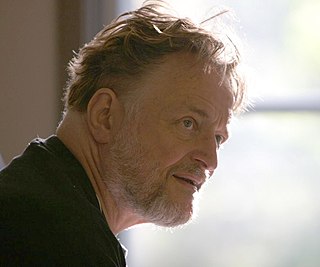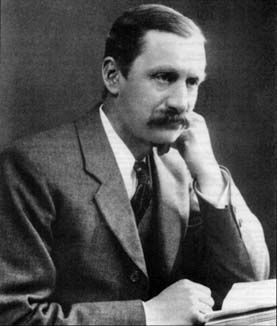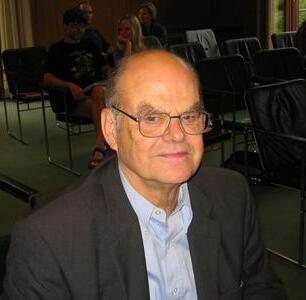
Gottfried Wilhelm Leibniz or Leibnitz was a German polymath active as a mathematician, philosopher, scientist and diplomat who is disputed with Sir Isaac Newton to have invented calculus in addition to many other branches of mathematics, such as binary arithmetic, and statistics. Leibniz has been called the "last universal genius" due to his knowledge and skills in different fields and because such people became much less common after his lifetime with the coming of the Industrial Revolution and the spread of specialized labor. He is a prominent figure in both the history of philosophy and the history of mathematics. He wrote works on philosophy, theology, ethics, politics, law, history, philology, games, music, and other studies. Leibniz also made major contributions to physics and technology, and anticipated notions that surfaced much later in probability theory, biology, medicine, geology, psychology, linguistics and computer science.

Gregory John Chaitin is an Argentine-American mathematician and computer scientist. Beginning in the late 1960s, Chaitin made contributions to algorithmic information theory and metamathematics, in particular a computer-theoretic result equivalent to Gödel's incompleteness theorem. He is considered to be one of the founders of what is today known as algorithmic complexity together with Andrei Kolmogorov and Ray Solomonoff. Along with the works of e.g. Solomonoff, Kolmogorov, Martin-Löf, and Leonid Levin, algorithmic information theory became a foundational part of theoretical computer science, information theory, and mathematical logic. It is a common subject in several computer science curricula. Besides computer scientists, Chaitin's work draws attention of many philosophers and mathematicians to fundamental problems in mathematical creativity and digital philosophy.

John Horton Conway was an English mathematician active in the theory of finite groups, knot theory, number theory, combinatorial game theory and coding theory. He also made contributions to many branches of recreational mathematics, most notably the invention of the cellular automaton called the Game of Life.
In mathematics, a profinite group is a topological group that is in a certain sense assembled from a system of finite groups.

Sir Henry Walford Davies was an English composer, organist, and educator who held the title Master of the King's Music from 1934 until 1941. He served with the Royal Air Force during the First World War, during which he composed the Royal Air Force March Past, and was music adviser to the British Broadcasting Corporation, for whom he gave commended talks on music between 1924 and 1941.

William Burnside was an English mathematician. He is known mostly as an early researcher in the theory of finite groups.
In mathematics, Grothendieck's Galois theory is an abstract approach to the Galois theory of fields, developed around 1960 to provide a way to study the fundamental group of algebraic topology in the setting of algebraic geometry. It provides, in the classical setting of field theory, an alternative perspective to that of Emil Artin based on linear algebra, which became standard from about the 1930s.
In topology and related areas of mathematics, a Stone space, also known as a profinite space or profinite set, is a compact Hausdorff totally disconnected space. Stone spaces are named after Marshall Harvey Stone who introduced and studied them in the 1930s in the course of his investigation of Boolean algebras, which culminated in his representation theorem for Boolean algebras.

Sir John Milford Rutter is an English composer, conductor, editor, arranger, and record producer, mainly of choral music.

John Griggs Thompson is an American mathematician at the University of Florida noted for his work in the field of finite groups. He was awarded the Fields Medal in 1970, the Wolf Prize in 1992, and the Abel Prize in 2008.

David Sloan Wilson is an American evolutionary biologist and a Distinguished Professor Emeritus of Biological Sciences and Anthropology at Binghamton University. He is a son of author Sloan Wilson, a co-founder of Evolution Institute and a co-founder of Prosocial World. He has studied social evolution in Binghamton.

In mathematics, the absolute Galois groupGK of a field K is the Galois group of Ksep over K, where Ksep is a separable closure of K. Alternatively it is the group of all automorphisms of the algebraic closure of K that fix K. The absolute Galois group is well-defined up to inner automorphism. It is a profinite group.
Robert Arnott Wilson is a retired mathematician in London, England, who is best known for his work on classifying the maximal subgroups of finite simple groups and for the work in the Monster group. He is also an accomplished violin, viola and piano player, having played as the principal viola in the Sinfonia of Birmingham. Due to a damaged finger, he now principally plays the kora.

The Mathematical Institute is the mathematics department at the University of Oxford in England. It is one of the nine departments of the university's Mathematical, Physical and Life Sciences Division. The institute includes both pure and applied mathematics and is one of the largest mathematics departments in the United Kingdom with about 200 academic staff. It was ranked as the top mathematics department in the UK in the 2021 Research Excellence Framework. Research at the Mathematical Institute covers all branches of mathematical sciences ranging from, for example, algebra, number theory, and geometry to the application of mathematics to a wide range of fields including industry, finance, networks, and the brain. It has more than 850 undergraduates and 550 doctoral or masters students. The institute inhabits a purpose-built building between Somerville College and Green Templeton College on Woodstock Road, next to the Faculty of Philosophy.

Daniel Segal is a British mathematician and a Professor of Mathematics at the University of Oxford. He specialises in algebra and group theory.

James Alexander "Sandy" Green FRS was a mathematician and Professor at the Mathematics Institute at the University of Warwick, who worked in the field of representation theory.

John Robert Stallings Jr. was a mathematician known for his seminal contributions to geometric group theory and 3-manifold topology. Stallings was a Professor Emeritus in the Department of Mathematics at the University of California at Berkeley where he had been a faculty member since 1967. He published over 50 papers, predominantly in the areas of geometric group theory and the topology of 3-manifolds. Stallings' most important contributions include a proof, in a 1960 paper, of the Poincaré Conjecture in dimensions greater than six and a proof, in a 1971 paper, of the Stallings theorem about ends of groups.
Marvin Lee Lamb is an American composer, music pedagogue and conductor.

Jan Saxl was a Czech-British mathematician, and a professor at the University of Cambridge. He was known for his work in finite group theory, particularly on consequences of the classification of finite simple groups.

Klaus Fredenhagen is a German theoretical physicist who works on the mathematical foundations of quantum field theory.















